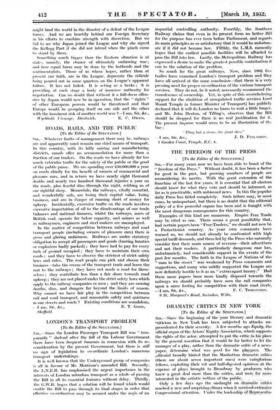ROADS, RAILS, AND THE PUBLIC
[To the Editor of the SPECTATOR.] Sot, Whatever faults of management there may be, railways are and apparently must remain our chief means of transport. In this country, with its hilly mining and manufacturing districts, canals offer no accommodation for more than a fraction of our traders. On the roads we have already for too much vehicular traffic for the safety of the public or the good of the public purse. We are spending over £50,000,000 a year on roads chiefly for the benefit of owners of commercial and pleasure cars, and in return we have nearly eight thousand deaths and nearly two hundred thousand injuries a year on the roads, plus fearful dins through the night, robbing us of our rightful sleep. Meanwhile, the railways, vitally essential, and wonderfully safe, are losing their capital value, losing business, and are in danger of running short of money for upkeep. Incidentally, excessive traffic on the roads involves excessive importation of oil to the disadvantage of our trade balances and national finances, whilst the railways, users of British coal, operate far below capacity, and miners as well as railwaymen, engineers and steel makers are unemployed.
In the matter of competition between railways and road transport people (including owners of pleasure cars) there is gross and glaring unfairness. Railways are under statutory obligation to accept all passengers and goods (barring lunatics or explosives badly packed) ; they have had to pay for every inch of ground occupied ; they have to maintain their own roads ; and they have to observe the strictest of strict safety laws and rules. The road people can pick and choose their business—take the cream of the transport trade and leave the rest to the railways ; they have not made a road for them- selves ; they contribute less than a fair share towards road upkeep ; they are not placed under the strict safety laws which apply to the railway companies or men ; and they are causing deaths, dins, and dangers far beyond the limits of reason. Why eamart we have fair play in • the competition between rail and road transport, and reasonable safety and quietness in our streets and roads ? Existing conditions are scandalous.






































 Previous page
Previous page